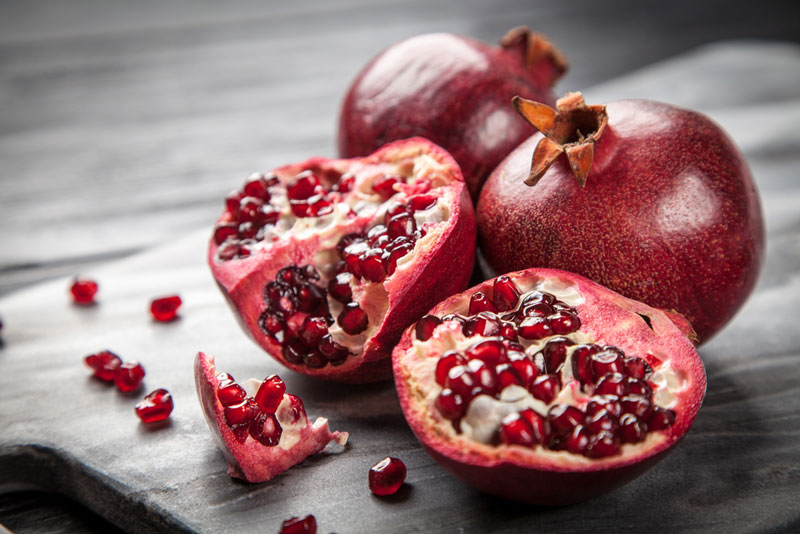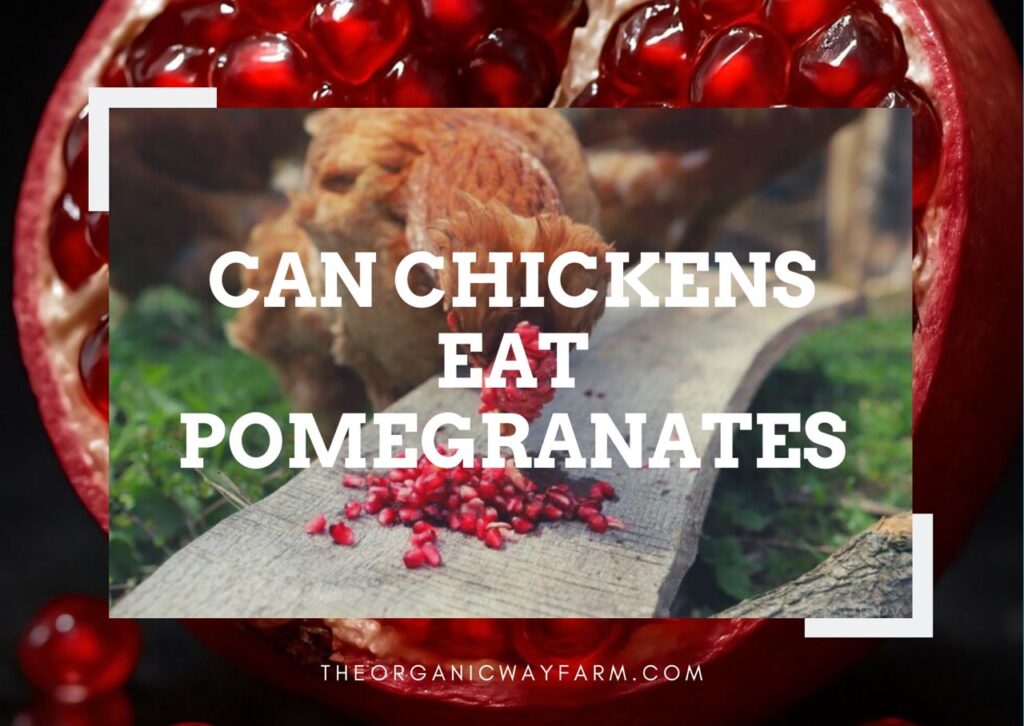If you have chickens, you might be curious about what tasty treats you can share with them. One question that often comes up is, “Can chickens eat pomegranates?” Well, you’re not alone in wondering! It’s a common question among chicken owners who want to provide a varied diet for their feathered friends.
The good news is that chickens can eat pomegranates! This delicious fruit is packed with nutrients and can be an enjoyable addition to their diet. However, like with any treat, moderation is key. You may be asking, “How much can they eat, and are there any risks?” Those are great questions, and I’m here to help unravel them for you. So, keep reading to learn more about feeding pomegranates to chickens and what other fruits they may enjoy. We will be looking at:
- Can Chickens Eat Pomegranates?
- How Much Pomegranates Can Chickens Eat?
- Best Ways to Feed Pomegranates to Chickens
- Benefits of Feeding Pomegranates to Chickens
- Risks and Dangers of Feeding Pomegranates to Chickens
- Substitutes for Pomegranates for Chickens
Let’s get started!
Can Chickens Eat Pomegranates?

When pondering that question, yes, chickens can safely consume pomegranates! This fruit is not toxic to them, and it offers various health benefits. Pomegranates are a juicy fruit typically characterized by their bright red color and are filled with small, edible seeds known as arils. Chickens may enjoy pecking at these seeds, which can make for a delightful snack.
Pomegranates are not a traditional part of a chicken’s diet, primarily consisting of grains and greens. However, we can introduce new fruits occasionally as a way to provide variety. By adding different foods, we help prevent our chickens from getting bored with their diet. After all, who doesn’t love a little bit of variety in their meals? When we look at the nutritional profile of pomegranates, we see that they are rich in antioxidants, vitamins, and minerals that can contribute positively to our chickens’ overall health.
How Much Pomegranates Can Chickens Eat?
Putting pomegranates on the menu for our chickens requires some consideration regarding portions. These fruits should be treated as a treat and not be the primary component of their diet. Think of pomegranates as an occasional delicacy rather than a staple food. A good rule of thumb is to offer chickens pomegranates in moderation. A few arils or a small section of the fruit every now and then is plenty.
Watch your chickens as they enjoy this new treat, and remember that their primary diet should still focus on chicken feed, grains, fresh fruits, and vegetables. By substituting pomegranates for some of the usual snacks your chickens receive, you can maintain a balance without overwhelming their digestive systems with too much sugar or new food at once. We recommend introducing pomegranates gradually and observing how your birds respond to them before making them a regular addition to their diet.
So, how much is too much? It really depends on the size of your flock and the individual preferences of your chickens. If your chickens seem to enjoy pomegranates, it’s fine to offer them occasionally. However, keep portion sizes small to ensure that your chickens don’t fill up on treats instead of their regular feed. Responsible feeding habits are key to keeping our chickens healthy and happy!
Best Ways to Feed Pomegranates to Chickens
Knowing how to properly serve pomegranates to chickens can make a big difference in their enjoyment and safety. One great method is to take the fruit and cut it into sections. Offering them a few seeds or a whole section can make it easier for your chickens to enjoy the fruit while minimizing mess. Chickens are naturally curious creatures, so they will most likely peck at the pomegranate and eventually figure out how to eat the juicy seeds inside.
Another approach is to remove the seeds from the fruit and mix them into their regular feed or scatter them on the ground. This approach not only lets your chickens enjoy the pleasant taste of pomegranates but also encourages foraging behavior, which keeps them engaged. Chickens love pecking around, so scattering seeds can make it a fun activity for them. When feeding chickens, it’s also essential to provide clean, fresh water, especially if they are trying out new foods like pomegranates that contain juice.
Chickens can also enjoy pomegranates in various forms. For instance, you can mash the seeds into a treat mix with grains or even mix them into homemade treats. Using fruits in our mixes provides extra nutrients, ensuring our chickens are receiving diverse vitamins. Every time we try different feeding methods, we learn which ones our chickens like best, and it can lead to exciting meal choices.
Benefits of Feeding Pomegranates to Chickens
Hydration
Pomegranates are a juicy fruit, making them an excellent source of hydration for our feathered friends. Keeping chickens well-hydrated is crucial, especially during hot weather or after giving them a little treat. The moisture content in pomegranates can help support their overall health and well-being. Hydration is essential for various bodily functions, including digestion and temperature regulation. Providing a variety of fruits like pomegranates helps ensure our chickens receive the hydration they need to thrive.
Fiber
Pomegranates also contain fiber, which can benefit our chickens’ digestive health. Fiber is important for promoting proper digestion and maintaining gut health, allowing our chickens to process their feed more effectively. When chickens receive enough fiber in their diets, it can help prevent digestive issues such as constipation, gizzard impaction, and even certain diseases. Thus, adding a fiber-rich fruit like pomegranates in moderation can be a helpful addition to their diet.
Vitamins and Minerals
This delicious fruit is rich in essential vitamins and minerals. Pomegranates contain vitamin C, which can boost the immune system of our chickens and enhance their overall health. We can also find other beneficial nutrients such as potassium, which supports healthy heart function, and folate, which is crucial for cell function and growth. Providing diverse sources of nutrition helps keep our chickens happy and healthy.
Mental Stimulation
Chickens enjoy exploring new foods, and offering pomegranates can provide them with mental stimulation. They are intelligent animals that thrive when they have new challenges and experiences. By introducing different fruits into their diet, we can encourage natural foraging behaviors as they peck around to find the seeds. Mental stimulation is critical for their happiness and can also help reduce stress levels.
Nutritional Breakdown of Pomegranates
In general, pomegranates provide an excellent nutritional profile. While they are particularly known for their antioxidant properties, they also offer a range of important vitamins and minerals. Antioxidants play a significant role in supporting the overall well-being of chickens and protecting them from oxidative stress. As we explore the benefits of offering this fruit to our chickens, it becomes clear that pomegranates are not just tasty but can also be a valuable addition to their diet.
Dangers of Feeding Too Much Pomegranates to Chickens
As with any treat, there are some risks associated with feeding pomegranates to chickens. Though this fruit is generally safe, it is essential to pay attention to how it is introduced into their diets. One potential risk is the choking hazard posed by pomegranate seeds, especially if chickens are offered large pieces or are not used to eating the fruit. To minimize this risk, we should ensure that the seeds are available in smaller portions, as well as opting for whole pieces that are easier for them to manage.
Overindulgence in any treat can lead to digestive problems. If chickens consume too many pomegranate seeds or sections, it may upset their stomachs or lead to loose droppings. Moderation is vital when we’re introducing new foods into their diet. If we observe that our chickens show signs of discomfort, it’s essential to reduce the amount or exclude pomegranates until they adjust.
Similarly, let us also consider the sugar content in fruits like pomegranates. While natural sugars are generally healthier than processed sugars, excessive sugar can still lead to weight gain and other health issues in chickens. We must strike a balance and ensure that their diet consists primarily of chicken feed with occasional fruits and vegetables offered as treats.
Substitutes for Pomegranates for Chickens
If pomegranates are not available or if your chickens don’t seem to enjoy them, there are plenty of other fruits we can consider. Many chickens love apples, bananas, berries, and grapes. These fruits also offer various health benefits and can be given in moderation just like pomegranates. For example, apples are high in fiber, while berries are packed with antioxidants.
Choosing seasonal fruits is another great way to ensure our chickens get a varied diet. In the summer months, watermelon can be a refreshing treat, while in the fall, pumpkin is nutritious and delicious for our birds. The key is to observe our chickens and see which fruits they enjoy most, so we can keep their meals exciting and beneficial.
Frequently Asked Questions
Are pomegranates safe for chickens to eat?
Yes, pomegranates are safe for chickens to eat when offered in moderation.
How do I prepare pomegranates for my chickens?
Cut the fruit and offer it in small pieces, or separate the seeds to mix with their regular feed.
How often can I give pomegranates to my chickens?
Pomegranates should be given as an occasional treat, not as a staple food.
What are the benefits of feeding pomegranates to chickens?
Pomegranates provide hydration, fiber, vitamins, and it can stimulate our chickens mentally.
What should I do if my chickens don’t like pomegranates?
If your chickens do not seem to favor pomegranates, try other fruits like apples or berries!
Final Thoughts
Feeding our chickens pomegranates can be an enjoyable experience for both the birds and us. We give our chickens variety and keep them engaged by offering new treats. Remember, moderation and mindful feeding practices are essential for their health. When we care for our chickens by providing a balanced diet that includes occasional fruity treats, we contribute to their happiness and well-being. If you’re curious about other fruits chickens can enjoy, check out this article on can chickens eat grapes for more insights!






